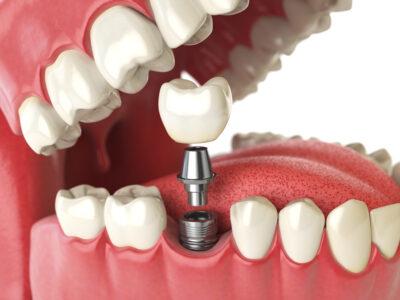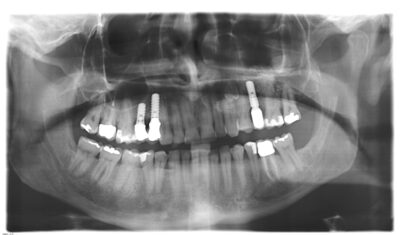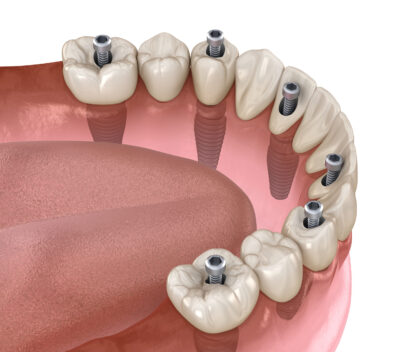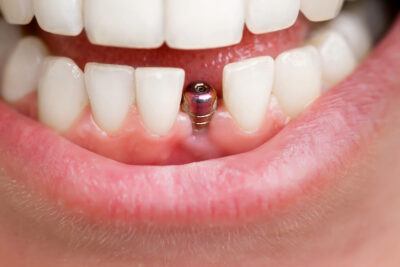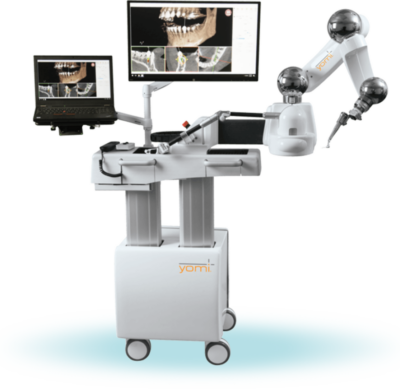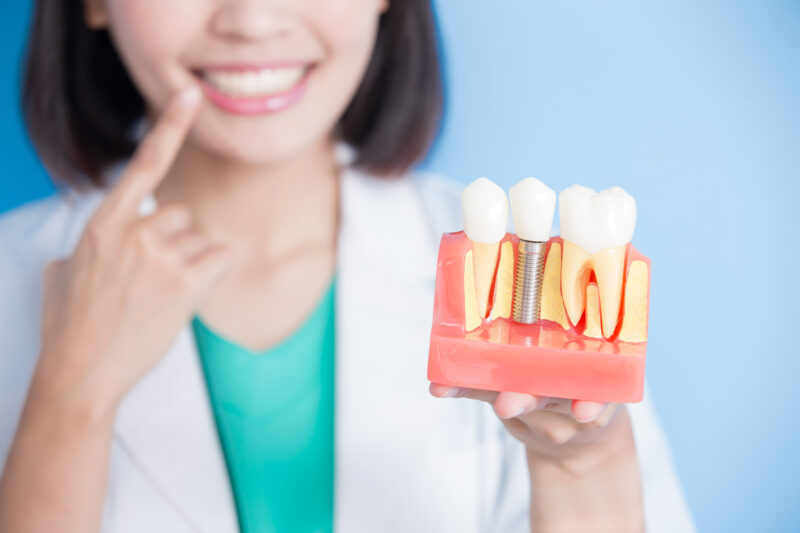
If you have multiple missing teeth or severe and accelerating damage to your natural teeth, your oral surgeon may recommend a full mouth dental implants procedure.
This type of dental work may initially sound complicated and even scary. However, when you embark on a dental implant procedure with the best oral surgeon and dental specialist in San Jose and the Bay Area, you’ll quickly discover that implant surgery is a solution that enhances your well-being, your smile, and your oral health.
Full mouth implant procedures are generally considered a better and more permanent fix than traditional dentures. Therefore, the one regret of many patients is that they didn’t consider a full mouth dental implant procedure earlier.
If your smile requires a complete transformation due to concerns about multiple missing teeth or deteriorating existing teeth, then it’s time to consider full mouth dental implants. Exploring implant surgery could reveal whether it’s the optimal solution for your dental needs.
Table of Contents
Who is a Good Candidate for a Full Mouth Dental Implant Procedure?
How the Full Dental Implant Procedure Works
Full Mouth Dental Implants or Dentures?
What to Expect After the Full Mouth Dental Implant Procedure
How to Take Care of Your Full Mouth Dental Implants After the Procedure
Where to Find Dental Implants in San Jose and the Bay Area
What are Full Mouth Dental Implants?
Full mouth dental implants are essentially artificial teeth. However, unlike dentures, they are permanently affixed in your upper or lower jaw to serve as replacement teeth that look and function just like natural teeth.
Your oral surgeon may recommend full mouth dental implant surgery as an option for replacing missing teeth. Especially if you have several teeth that are missing, damaged, or expected to deteriorate and cause further damage.
Despite the “full mouth dental implant” name, these dental implants don’t always replace every tooth in a patient’s mouth. Dental implants are often only needed in the lower jaw or the upper jaw, depending on where solid remaining natural teeth are located.
Before recommending a full mouth dental implant procedure, your dentist will do a thorough examination at the dentist’s office to determine bone health, jaw health, and the condition of your damaged teeth and other teeth.
Depending on your medical history, the number of missing teeth or damaged teeth, and your overall oral health (such as the condition of your tooth, roots, and gum tissue), your dentist may determine that a full mouth dental implant procedure is the best solution for your distinctive medical conditions.
Who is a Good Candidate for a Full Mouth Dental Implant Procedure?
Since placing dental implants requires minor surgery, a patient should be in overall good health, with no existing medical conditions that could hinder the success of a dental implant surgery.
A dentist or oral surgeon may recommend a full mouth dental implant procedure based on the following factors.
- You have multiple damaged and missing teeth and want a full and beautiful smile. (In other words, you require more than one implant.)
- You have one missing tooth, but there is a health concern the other remaining natural teeth may also deteriorate over time.
- You want permanent new teeth, and you do not want a more temporary solution like traditional dentures.
- You are comfortable with general anesthesia or local anesthesia.
- You have adequate bone in your jaw to support the dental implants.
- Your gum tissues are in good health and are free of periodontal disease.
- You can commit to the entire process, (while it’s possible to replace missing teeth in a day, multiple dentist office visits may be required, depending on your unique medical needs.)
- You are willing and able to take steps to preserve your oral health and your new dental implants, like daily cleaning and brushing.
How the Full Mouth Dental Implant Procedure Works
Step 1 – Initial Consultation and Dentist Exam
On your first visit to the dentist’s office (just like any routine visit to the dentist), your oral surgeon or dental specialist will examine your mouth. In addition, they will pay particular attention to any damaged or missing teeth, gum tissue, and jawbone.
They will perform a complete oral health exam and will likely take X-rays to better understand the state of your jaw and gums. All of this is needed to ensure dental implants can be safely added.
Step 2 – Pre-dental Implant Surgery Preparation
Depending on your initial dentist visit, your oral surgeon may recommend a few preparation steps to ensure your mouth is ready for dental implants.
This may include a bone graft and tooth extraction of remaining natural teeth to allow full mouth dental implants to be fitted. However, it could also be as simple as prescribing antibiotics if you have gum disease to reduce the overall risks to your oral health.
What is a bone graft?
Bone grafting is an oral surgery procedure that is minimally invasive, and which adds volume and density to your jawbone.
A bone graft may be recommended if you require one dental implant, full mouth dental implants, or other situations as your oral health dictates.
A bone graft uses transplanted bone to rebuild the damaged or diseased bones in the patient’s mouth. Procedures like bone grafting are common (both for dental implants and other common dental procedures). Therefore, bone grafting ensures the jawbone is ready for full mouth dental implant surgery.
Step 3 – The Full Mouth Dental Implant Procedure and Dental Implant Surgery
There are several options when it comes to dental implants.
You may be able to receive new teeth in a day, or it may take a secondary dentist office visit for your artificial teeth to be custom-made. If a second visit is required, your oral surgeon will provide a temporary prosthesis to ensure you can chew, smile, and enjoy everyday activities as usual. .
When it’s time for the dental implant placement, your oral surgeon will strategically place the four dental implant posts into the jawbone to ensure a solid metal frame for the replacement teeth.
Why are there four dental implants? (Or why is it called “All-on-4 dental implants?”)
The four dental implants are designed to create stability. Placed in your upper or lower jaw, the four implants are divided into the patient’s mouth in the front and back of the jawbone, on both the right and left sides of the mouth.
Having four dental implants (or four full dental implant posts) simply ensures that your new full mouth dental implants stay exactly where they need to be while stabilizing and enhancing the health of your bone structure.
When the four dental implants are installed, they are designed to act like natural tooth roots. Therefore, once these dental implant posts and abutments have been placed in the jawbone, a temporary prosthesis may also be placed. However, if the final prosthesis is still being custom-created, or a patient needs a little healing time before a final prosthesis can be implanted (depending on the patient’s unique oral health needs.)
Once a patient’s mouth has fully healed, the temporary prosthesis can be replaced with the custom-made final prosthesis. Your oral health care provider may place an abutment on each implant to allow a healing cap to be easily placed. The healing cap will protect the dental implants while your gums and jawbone heal around it.
Step 4 – Follow-up and Final Care for Your New Dental Implants
Once you are fully healed, your dentist may remove the healing cap and place a restoration on the implant or implants, depending on the original reasons for the dental implant procedure.
For example, if you need a full mouth dental implant to replace a missing tooth, your dentist or oral surgeon may place a crown, a bridge, or a partial or temporary denture on the implant.
How long does it take to get dental implants?
The answer to this question depends on the patient’s unique needs and potential health concerns. For example, possible bone deterioration, the health of the jaw and gums, and the health of any remaining teeth attached to the jawbone. However, dental implant surgery is a streamlined procedure, and many people can return to work a day or two after the implant surgery.
As for fully recovering, it can take 4-6 months before a patient is fully healed and the new teeth act and function exactly like the replaced teeth or existing teeth.
Full Mouth Dental Implants or Dentures? How to decide…
Both full mouth dental implants and dentures can result in more confidence and a better smile. However, there are some key differences between these two solutions to missing or damaged teeth.
If you’re unsure whether your dentures or full mouth dental implants are a better option, then consider the following key differences.
- Dental implant costs are generally higher than dentures (at least up-front). However, full mouth dental implants can last for 20 years or more, as opposed to dentures which are a more temporary solution. In addition, full mouth dental implant costs may be covered by dental insurance, depending on your health insurance provider. (Although it should be noted that the best Bay Area dental providers offer multiple options when it comes to dentures, so dentures can have a comfortable and long lifespan.)
- Dentures do not solve additional oral health issues, like jawbone deterioration. When your body and mouth detect a missing tooth, it starts to absorb the minerals in your jaw to use elsewhere. When this occurs, the area in the jaw where the tooth root used to exist starts to weaken and deteriorate, leading to more oral health issues over time.
- Dentures also can’t protect or replace adjacent teeth, and teeth adjacent to the gap of the missing tooth may start to lean or tilt toward the open space in the mouth. This can alter the shape of a patient’s face and may make wearing dentures more difficult over time.
- Dentures require more maintenance because they aren’t permanently affixed to the patient’s mouth. Also, dentures can slip and may need to be repositioned, which could require extra dentist visits.
- After the healing process, dental implants are more comfortable and look, feel, and function like natural teeth – generally, more so than dentures.
- Full mouth dental implants are also custom-made to look and match your surrounding teeth on the other hand, dentures may look a little more fake and may not exactly match the color of your natural teeth. Again, this potential hurdle can be avoided by using the best Bay Area dental specialist.
Dental Implants with Yomi Robot
Dental implants are generally considered a more sustainable and permanent solution to dentures. However, your best bet is to consult with a trusted oral surgeon when deciding between the two options.
At Pannu Dental Group, we use advanced technology like robot-assisted dentistry to provide the least invasive and most successful dental implant procedure possible. So, even if you’re nervous about spending time in the dentist’s chair (which makes dentures initially seem like a better and less invasive option), a Bay Area dental specialists like Pannu Dental Group can put your mind at ease and ensure a safe and comfortable procedure from start to finish.
What to Expect After the Full Mouth Dental Implant Procedure
Once your full mouth dental implants have been placed, you may experience some normal discomfort that occurs after oral surgery, such as the following:
- Minor swelling of the gums
- Minor bruising of the gums or mouth
- Minor pain at the dental implant site
- Minor or infrequent bleeding at the dental implant site
- Tenderness when chewing
- Sensitivity in the sinus vacancies, especially if dental implants are placed in the upper jaw
Your dentist may prescribe pain medications or antibiotics if there is concern about discomfort after a full mouth dental implant procedure. In addition, they will likely recommend that you stick to soft foods while the surgical site heals.
How to Take Care of Your Full Mouth Dental Implants After the Procedure
Essentially, taking care of your new implants after a full mouth dental implant procedure requires the same steps as taking care of your natural teeth. These steps include the following:
- Stick to good oral hygiene habits – Brush daily, and keep your new teeth clean, just like you would with natural teeth. After your procedure, your dentist may recommend a special toothbrush, like an interdental brush that seamlessly slides between teeth, to help clean all the nooks and crannies around teeth, gums, and everything in between.
- Change your habits – Avoid hard foods like hard candy right after your full mouth dental implant procedure and avoid tooth-staining habits like smoking to keep your smile bright.
- Be sure to keep seeing your dentist – Regular dentist office visits are imperative across the board, and routine checkups will ensure your new dental implants are a permanent success.
Where to Find Dental implants in San Jose and the Bay Area
Your best resource for learning more about full mouth dental implants and the specifics of dental implant surgery is to start with a consultation.
Pannu Dental Group uses the most technologically advanced tools available in the field of dentistry, combined with decades of expertise, to offer the best solutions possible, one patient at a time.
Our client-focused care and attention ensure that you’ll have a positive experience if you need dental implant surgery (or any dental procedure). Our goal is to ensure that you’ll leave with a perfect smile that will enhance your confidence from the inside out.
If you want a better, brighter, and permanent smile, then it’s time to consider the many benefits of a full mouth dental implant procedure.
Therefore, remember that full mouth dental implant procedures aren’t just for transforming your smile – they’re designed to improve and maintain the health of your jawbone and natural teeth for years to come.
Get a jumpstart on a better smile today and connect with the experts at Pannu Dental Group. With full mouth dental implants, you’ll find a lifelong solution that will improve your oral health.

Dr. Dalvir S. Pannu has been a practicing dentist since 1995. In 1996 he opened his first dental practice in India, where he gained invaluable experience and acumen. In October of 1997 he was invited by the American Dental Association (ADA) to present the table clinic on Endodontics, at their annual session held in Washington, D.C. At this time he fell in love with the United States and became passionate about practicing dentistry in California. He became particularly enamored of the San Francisco Bay area, and soon took up residence and work here.

